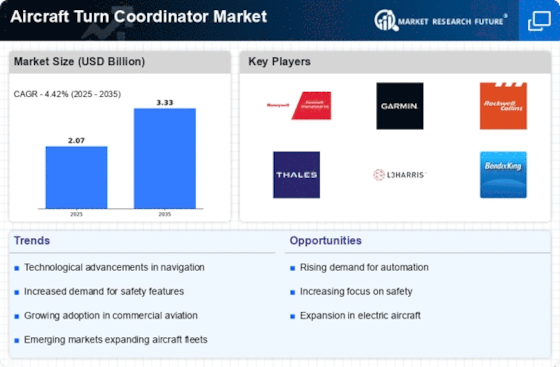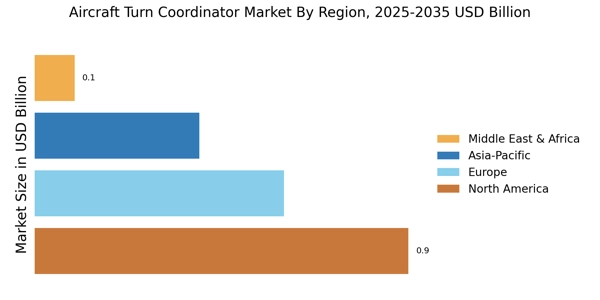Expansion of the Aviation Sector
The aircraft turn coordinator Market is benefiting from the expansion of the aviation sector, which is characterized by an increase in air travel and the establishment of new airlines. As more individuals and businesses opt for air travel, the demand for aircraft is rising, leading to a corresponding need for essential components such as turn coordinators. The International Air Transport Association (IATA) has reported a steady increase in passenger numbers, which is expected to continue in the coming years. This growth in the aviation sector is likely to stimulate investments in aircraft technology, including turn coordinators, thereby enhancing the Aircraft Turn Coordinator Market. The expansion of regional and low-cost carriers further contributes to this trend, as these airlines require reliable navigation instruments to ensure safe operations.
Regulatory Compliance and Safety Standards
The Aircraft Turn Coordinator Market is significantly influenced by stringent regulatory compliance and safety standards imposed by aviation authorities. Organizations such as the Federal Aviation Administration (FAA) and the European Union Aviation Safety Agency (EASA) have established rigorous guidelines that manufacturers must adhere to. These regulations ensure that turn coordinators meet specific performance and safety criteria, thereby enhancing overall flight safety. As a result, manufacturers are compelled to invest in research and development to comply with these standards, which in turn drives innovation within the market. The increasing emphasis on safety in aviation operations suggests that the demand for compliant turn coordinators will continue to rise, further propelling the Aircraft Turn Coordinator Market forward.
Growing Demand for Flight Safety and Efficiency
The Aircraft Turn Coordinator Market is witnessing a surge in demand driven by the increasing focus on flight safety and operational efficiency. Airlines and operators are prioritizing technologies that enhance situational awareness and reduce the risk of accidents. The integration of turn coordinators into flight instruments is crucial for pilots to maintain control during turns, thereby improving safety. Market data indicates that the global aviation sector is expected to expand, leading to a higher number of flights and, consequently, a greater need for reliable turn coordinators. This trend suggests that the Aircraft Turn Coordinator Market will continue to thrive as stakeholders seek to enhance safety measures and operational efficiency.
Technological Advancements in Navigation Systems
The Aircraft Turn Coordinator Market is experiencing a notable shift due to rapid technological advancements in navigation systems. Innovations such as digital displays and enhanced sensor technologies are being integrated into turn coordinators, improving accuracy and reliability. The introduction of advanced materials and manufacturing techniques has also contributed to the development of lighter and more efficient devices. According to recent data, the market for navigation systems is projected to grow at a compound annual growth rate of approximately 5.2% over the next five years. This growth is likely to drive demand for sophisticated turn coordinators, as they are essential for modern aircraft operations. As airlines and manufacturers prioritize safety and efficiency, the Aircraft Turn Coordinator Market is poised to benefit from these technological enhancements.
Emerging Markets and Increased Aircraft Production
The Aircraft Turn Coordinator Market is poised for growth due to the emergence of new markets and increased aircraft production rates. Countries in Asia and the Middle East are witnessing a rise in air travel demand, prompting local manufacturers to ramp up production. This trend is supported by government initiatives aimed at enhancing aviation infrastructure and promoting air travel. As new aircraft are produced, the need for turn coordinators becomes paramount, as they are integral to flight safety and navigation. Market analysts suggest that the Aircraft Turn Coordinator Market will see a significant uptick in demand as these emerging markets continue to develop their aviation capabilities, leading to a robust increase in aircraft production and, consequently, turn coordinator requirements.

















